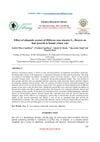 128 citations,
July 2009 in “International Journal of Pharmaceutics”
128 citations,
July 2009 in “International Journal of Pharmaceutics” PEVs improve minoxidil skin penetration, increasing hair growth.
 4 citations,
January 1994 in “Yakugaku zasshi”
4 citations,
January 1994 in “Yakugaku zasshi” EPC-K is stable except at very acidic pH or when exposed to sunlight, and it can decompose in low ethanol concentrations.
 33 citations,
June 1995 in “Journal of Pharmaceutical Sciences”
33 citations,
June 1995 in “Journal of Pharmaceutical Sciences” More ethanol increases minoxidil delivery, but too much lowers efficiency.
 34 citations,
October 1994 in “Journal of Pharmaceutical Sciences”
34 citations,
October 1994 in “Journal of Pharmaceutical Sciences” Ethanol over 50% helps minoxidil absorb better into skin.
 19 citations,
July 2020 in “Journal of drug delivery science and technology”
19 citations,
July 2020 in “Journal of drug delivery science and technology” Nanoemulsions with minoxidil and clove oil effectively target hair follicles for better alopecia treatment.
 6 citations,
January 2016 in “Springer eBooks”
6 citations,
January 2016 in “Springer eBooks” Invasomes effectively deliver drugs through the skin and have potential for improved treatments.
 6 citations,
May 2020 in “Pharmacology Research & Perspectives”
6 citations,
May 2020 in “Pharmacology Research & Perspectives” A new gel form of minoxidil is equally effective for hair growth and safer for the heart and other organs than the traditional solution.
 8 citations,
October 2020 in “Pharmaceutics”
8 citations,
October 2020 in “Pharmaceutics” Dutasteride-loaded nanoparticles coated with Lauric Acid-Chitosan show promise for treating hair loss due to their controlled release, low toxicity, and potential to stimulate hair growth.
 5 citations,
August 2014 in “Pharmaceutical Development and Technology”
5 citations,
August 2014 in “Pharmaceutical Development and Technology” Propylene glycol and ethanol increase finasteride skin absorption, sodium lauryl sulfate doesn't.
 47 citations,
April 2017 in “European Journal of Pharmaceutics and Biopharmaceutics”
47 citations,
April 2017 in “European Journal of Pharmaceutics and Biopharmaceutics” The new dutasteride formula can be applied to the skin, may promote hair growth, and has fewer side effects.
 23 citations,
January 2001 in “International journal of toxicology”
23 citations,
January 2001 in “International journal of toxicology” St. John's Wort extract and oil safety in cosmetics is unclear; more data needed on photosensitization, toxicity, and human irritation.
 22 citations,
November 2018 in “Brazilian Journal of Pharmaceutical Sciences”
22 citations,
November 2018 in “Brazilian Journal of Pharmaceutical Sciences” New physical methods like electrical currents, ultrasound, and microneedles show promise for improving drug delivery through the skin.
 21 citations,
January 2003 in “Skin pharmacology and physiology”
21 citations,
January 2003 in “Skin pharmacology and physiology” Different skin cells process testosterone differently, and certain drugs can change this process, possibly helping treat acne and hair loss.
 10 citations,
May 2021 in “Expert Opinion on Drug Delivery”
10 citations,
May 2021 in “Expert Opinion on Drug Delivery” Coenzyme Q10 vesicular formulations can potentially treat androgenic alopecia by promoting hair growth and thickness.
The new minoxidil gel reduces runoff and improves eyebrow hair growth.
December 2012 in “http://isrctn.org/>”  11 citations,
December 2011 in “Revista Brasileira de Farmacognosia”
11 citations,
December 2011 in “Revista Brasileira de Farmacognosia” The seeds of Abrus precatorius, when processed, can prevent hair loss more effectively than common treatments.
 25 citations,
July 2017 in “Archives of Dermatological Research”
25 citations,
July 2017 in “Archives of Dermatological Research” Herbal products might promote hair growth with fewer side effects, but more research is needed to confirm their safety and effectiveness.
 11 citations,
January 2014 in “International Journal of Trichology”
11 citations,
January 2014 in “International Journal of Trichology” Witch hazel-based hair products improved scalp irritation and were well-tolerated.
 January 2013 in “Springer eBooks”
January 2013 in “Springer eBooks” Hair care products are important for appearance and self-esteem, and choosing the right ones can help maintain healthy hair.
1 citations,
February 2024 in “Pharmaceutics” Nanovesicles improve drug delivery through the skin, offering better treatment outcomes and fewer side effects.
 24 citations,
November 2018 in “International Journal of Molecular Sciences”
24 citations,
November 2018 in “International Journal of Molecular Sciences” Ethosomes improve drug delivery through the skin but may have side effects like irritation.
 4 citations,
January 2011 in “Der Pharmacia Lettre”
4 citations,
January 2011 in “Der Pharmacia Lettre” Hibiscus flower extract slowed down hair growth in rats.
 January 2014 in “Journal of Pharmaceutical Negative Results”
January 2014 in “Journal of Pharmaceutical Negative Results” Liquorice and Indian jujube root extracts don't help in fighting male pattern baldness.
 February 2024 in “Trends in Sciences”
February 2024 in “Trends in Sciences” Store Tectona grandis leaf extracts in slightly acidic, light-protected conditions for best stability.
 49 citations,
October 2017 in “Nutrients”
49 citations,
October 2017 in “Nutrients” Equisetum debile extract, especially the ethyl acetate type, may be a promising natural ingredient for anti-hair loss products.
 24 citations,
June 2011 in “Andrologia”
24 citations,
June 2011 in “Andrologia” Ganoderma lucidum may help treat enlarged prostate in rats.
 9 citations,
January 2014 in “DARU Journal of Pharmaceutical Sciences”
9 citations,
January 2014 in “DARU Journal of Pharmaceutical Sciences” Cuscuta reflexa extracts helped regrow hair in rats with drug-induced hair loss.
 7 citations,
September 2014 in “Beni-Suef University Journal of Basic and Applied Sciences”
7 citations,
September 2014 in “Beni-Suef University Journal of Basic and Applied Sciences” Cuscuta reflexa extracts and an isolate promoted hair growth and could be natural treatments for hair loss.
 May 2021 in “Boletín latinoamericano y del Caribe de plantas medicinales y aromáticas”
May 2021 in “Boletín latinoamericano y del Caribe de plantas medicinales y aromáticas” Microsechium helleri extract has antioxidant, anti-inflammatory, antidiabetic, and heart-protective benefits.



























